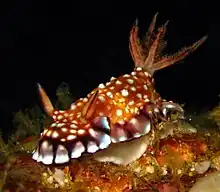Goniobranchus roboi
Goniobranchus roboi, common name the tooth-edged chromodoris, is a species of colourful sea slug, a dorid nudibranch, a marine gastropod mollusc in the family Chromodorididae.[1] This species was transferred from Chromodoris to Goniobranchus in 2012.[3]
| Goniobranchus roboi | |
|---|---|
 | |
| Goniobranchus cf. roboi | |
| Scientific classification | |
| Domain: | Eukaryota |
| Kingdom: | Animalia |
| Phylum: | Mollusca |
| Class: | Gastropoda |
| Subclass: | Heterobranchia |
| Order: | Nudibranchia |
| Suborder: | Doridina |
| Superfamily: | Doridoidea |
| Family: | Chromodorididae |
| Genus: | Goniobranchus |
| Species: | G. roboi |
| Binomial name | |
| Goniobranchus roboi (Gosliner & Behrens, 1998)[1] | |
| Synonyms[1] | |
Distribution
This marine species occurs in the tropical Indo-West Pacific. It was described from Okinawa, Japan. It has been reported from Queensland, New South Wales, Sulawesi, Réunion and South Africa. Similar animals from Western Australia have a different pattern on the mantle and are intermediate between G. roboi and Goniobranchus aurigerus.[4] There are several similar species which are not yet studied or named.[5]
Description
Goniobranchus roboi is a chromodorid nudibranch with a yellow mantle densely areolated with small white and larger lilac spots. The edge of the mantle is blue grading to white with dark purple stripes at right angles to the margin. The rhinophores and gills are white at the base grading into dark purple. The body length varies between 40 mm and 60 mm.[4][6][7][8]
References
- Bieler R, Bouchet P, Gofas S, Marshall B, Rosenberg G, La Perna R, Neubauer TA, Sartori AF, Schneider S, Vos C, ter Poorten JJ, Taylor J, Dijkstra H, Finn J, Bank R, Neubert E, Moretzsohn F, Faber M, Houart R, Picton B, Garcia-Alvarez O, eds. (2022). "Goniobranchus roboi (Gosliner & Behrens, 1998)". MolluscaBase. World Register of Marine Species. Retrieved 17 February 2022.
- Gosliner, Terrence M.; Behrens, D.W. (1998). "Five new species of Chromodoris (Molluscs: Nudibranchia: Chromodorididae) from the tropical Indo-Pacific Ocean". Proceedings of the California Academy of Sciences. 4th series. 50 (5): 139–165.
- Johnson, Rebecca Fay; Gosliner, Terrence M. (2012). "Traditional taxonomic groupings mask evolutionary history: A molecular phylogeny and new classification of the chromodorid nudibranchs". PLOS ONE. 7 (4): e33479. Bibcode:2012PLoSO...733479J. doi:10.1371/journal.pone.0033479. PMID 22506002.
- Rudman, W.B., 1998 (April 4) Chromodoris roboi Gosliner & Behrens, 1998. [In] Sea Slug Forum. Australian Museum, Sydney.
- Gosliner, T.M., Behrens, D.W. & Valdés, Á., 2018. Nudibranch and Sea Slug Identification - Indo-Pacific. New World Publications; 2nd Revised, Updated edition (1 Nov. 2018) 452 pp. ISBN 1878348671, ISBN 978-1878348678, p. 146
- Bolland, R. (1999) Type specimen of Goniobranchus roboi. At: Okinawa Slug Site
- Debelius, H. & Kuiter, R.H. (2007) Nudibranchs of the world. ConchBooks, Frankfurt, 360 pp. ISBN 978-3-939767-06-0 page(s): 164
- Gosliner, T.M., Behrens, D.W. & Valdés, Á. (2008) Indo-Pacific Nudibranchs and seaslugs. A field guide to the world's most diverse fauna. Sea Challengers Natural History Books, Washington, 426 pp. page(s): 223
External links
- "Chromodoris roboi". Gastropods.com. Retrieved 7 May 2012.